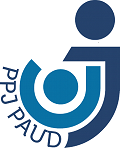HUBUNGAN LITERASI DIGITAL IBU DENGAN AKTIVITAS SHARENTING DI MEDIA SOSIAL
Abstract
Keywords
References
Adikara, G. J., Kurnia, N., Adikara, G. J., Kurnia, N., Adhrianti, L., Astuty, S., Wijayanto, X. A., Desiana, F., & Astuti, S. I. (2021). Aman bermedia digital (G. J. Adikara & N. Kurnia (eds.)). Direktorat Jenderal Aplikasi Indormatika.
Baron, R. J. (2019). Digital Literacy. The International Encyclopedia of Media Literacy, 1–6. https://doi.org/10.1002/9781118978238.ieml0053
Belshaw, D. A. J. (2012). What is digital literacy ? AParagmatic Investigation [Durham University]. http://etheses.dur.ac.uk/3446/
Biru, R. C. B., Asep, S., & Sardin. (2020). Analisis Literasi Digital Terhadap Pembelajaran Mandiri di Masa Pandemi Covid-19. Indosian Journal of Adult and Community Education, 2(2), 61–69. https://doi.org/https://doi.org/10.17509/ijace.v2i2.30882
Blum, A. (2017, June). Sharenting : Parent and managing children ’ s digital footprints. The London School of Economics and Political Science (LSE). https://eprints.lse.ac.uk/63324/
Brosch, A. (2018). Sharenting – Why Do Parents Violate Their Children ’ s Privacy ? The New Educational Review, 75–85. https://doi.org/10.15804/tner.2018.54.4.06
Duggan, M., Lenhart, A., Lempe, C., Ellison, N. B., Madden, M., Lee, R., Greenwood, S., Porteus, M., & Page, D. (2015). Parents and Social Media _. Pew Reseach Center, 13(3), 1576–1580. https://www.pewresearch.org/internet/2015/07/16/parents-and-social-media/
Dwiarsianti, A. (2022). Sharenting dan Privasi Anak: Studi Netnografi pada Unggahan Instagram dengan Tagar #Anakku. Jurnal Komunikasi Global, 11(1), 1–20. https://doi.org/10.24815/jkg.v11i1.24803
Fox, A. K., & Hoy, M. G. (2019). Smart Devices, Smart Decisions? Implications of Parents’ Sharenting for Children’s Online Privacy: An Investigation of Mothers. Journal of Public Policy and Marketing, 38(4), 414–432. https://doi.org/10.1177/0743915619858290
Holiday, S., Norman, M. S., Densley, R. L., Holiday, S., Norman, M. S., Sharenting, R. L. D., & Holiday, S. (2020). Sharenting and the extended self : self- representation in parents ’ Instagram presentations of their children parents ’ Instagram presentations of their children. Popular Communication, 00(00), 1–15. https://doi.org/10.1080/15405702.2020.1744610
Kementerian Komunikasi dan Informatika. (2021). Status Literasi Digital di Indonesia 2021 (S. Limuria & V. Zabkrie (eds.)). Kementerian Komunikasi dan Informatika.
Kemp, S. (2022). Indonesian Digital Report 2022. Hootsuite (We Are Social). https://datareportal.com/reports/digital-2022-indonesia
Kopecký, K., García-gonzález, A., & Gómez-garcía, G. (2022). Sharing images or videos of minors online : Validation of the Sharenting Evaluation Scale ( SES ). Children and Youth Services Review, 136(February), 106396. https://doi.org/10.1016/j.childyouth.2022.106396
Kumar, P. (2021). From oversharing to sharenting : how experts govern parents and their social media use. University of Maryland.
Kurniari, P. I., Yoanita, D., & Tjahyana, L. J. (2020). Analisis Isi Aktivitas Sharenting Yang Dilakukan Oleh Single Mothers di Instagram. Jurnal E-Komunikasi, 9(2019), 1–12.
Latipah, E., Cahyo, H., Kistoro, A., Hasanah, F. F., & Putranta, H. (2020). Elaborating Motive and Psychological Impact of Sharenting in Millennial Parents. Universal Journal of Education Research, 8(10), 4807–4817. https://doi.org/10.13189/ujer.2020.081052
Lazard, L., Locke, A., Capdevila, R., Roper, S., & Dann, C. (2019). Sharenting : Pride , affect and the day ‐ to ‐ day politics of digital mothering. WILEY, 1–10. https://doi.org/https://doi.org/ 10.1111/spc3.12443
Livingstone, S., & Blum-ross, A. (2018). What do parents think , and do , about their children ’ s online privacy ? Parenting for a Digital Future : Survey Report 3. LSE, May.http://www.lse.ac.uk/media-and-communications/assets/documents/research/preparing-for-a-digital-future/P4DF-Report-3.pdf
Martins, R. S., Mascarenhas, S. A. do N., & Resende, G. C. (2020). Oversharenting and family life. International Journal for Innovation Education and Research, 8(11), 155–170. https://doi.org/10.31686/ijier.vol8.iss11.2731
Masrul, M. (2018). Epidemi obesitas dan dampaknya terhadap status kesehatan masyarakat serta sosial ekonomi bangsa. Majalah Kedokteran Andalas, 41(3), 152. https://doi.org/10.25077/mka.v41.i3.p152-162.2018
Ndolo, I. S., Ekwe, O., & Akpan, L. E. (2022). Ethical Parenting In A Digital Word. In I. Haaz & J. W. Buhlmann (Eds.), Ethics, Media, Theology and Development in Africa (1st ed.). Globethics.net.
Novianti, D., & Fatonah, S. (2019). Budaya Literasi Media Digital Ibu-Ibu Rumah Tangga. Jurnal Antropologi : Isu-Isu Sosial Budaya, 21(02), 218–226. https://doi.org/https://doi.org/10.25077
Otero, P. (2017). Sharenting … should children ’ s lives be disclosed on social media ? Arch Argent Pediart, 115(5), 412–413. https://doi.org/http://dx.doi.org/10.5546/aap.2017.eng.412
Palupi, M. F. T., & Irawan, R. E. (2020). Eksploitasi Anak Melalui Akun Instagram ( Analisis Wacana Krisis Praktik Sharenting Oleh Selebgram Ashanty & Rachel Venya ). Komuniti : Jurnal Komunikasi Dan Teknologi Informasi, 12(1), 68–80. https://doi.org/http://dx.doi.org/10.23917/komuniti.v12i1.10703
Plunkett, L. A. (2019). Sharenthood Why We Should Think Before We Talk About Our Kids Online. The MIT Press. https://lccn.loc.gov/2018053938
Steinberg. (2017). Sharenting: Children’s privacy in the age of social media, 66 Emory Law Journal 839 (2017). http://law.emory.edu/
Sugiyono. (2019). Metode Penelitian Kuantitatif, Kualitatif dan R&D (Sutopo (ed.); 2nd ed.). Alfabeta Bandung.
Vélez, A. P., José, J., Olivencia, L., & Zuazua, I. I. (2017). The role of adults in children digital literacy. Procedia - Social and Behavioral Sciences, 237(June 2016), 887–892. https://doi.org/10.1016/j.sbspro.2017.02.124
Within, P. (2022). Why Privacy Matters (Issue June). Jonkoping University.
Yulia, A., Rodhiya, F., & Psikologi, F. (2020). What We Talk About When We Talk About: “Digital Parenting .” Psikobuletin : Buletin Ilmiah Psikologi, 1(1), 29–37.
DOI: https://doi.org/10.20961/ecedj.v5i3.101733
Refbacks
- There are currently no refbacks.
Copyright (c) 2025 Early Childhood Education and Development Journal

This work is licensed under a Creative Commons Attribution-NonCommercial-ShareAlike 4.0 International License.
Early Chilhood Education and Development Journal published by
Departement of Teacher Training of Early Childhood Education
Jalan Slamet Riyadi 449 Surakarta
Email: ecedjournal@gmail.com
Telp : (0271) 719 573

This work is licensed under a Creative Commons Attribution 4.0 International License


